In this article:
A full head of healthy hair can change your overall appearance. However, a common problem people face is split ends.
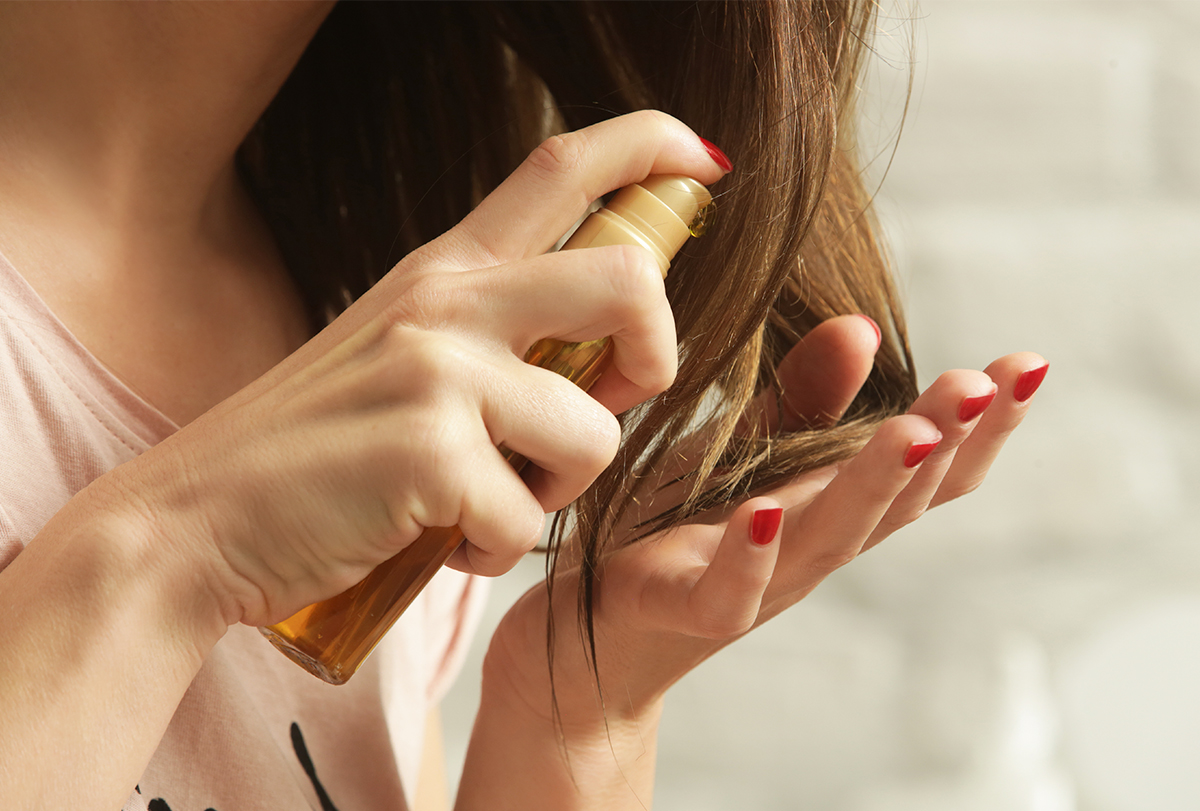
Split ends occur when the outer hair cuticle breaks away from the main shaft, leading to breakage. Such a split can even extend toward the root if not treated timely.
Various reasons contribute to the development of split ends. This article discusses different remedies to help treat and prevent split ends.
Home Remedies for Split Ends
The following natural treatments can help manage split ends:
1. Try coconut oil treatment
Coconut oil is an effective and popular moisturizing and healing agent. It is made up of medium-chain fatty acids (1) that are easily absorbed by the hair. Moreover, it has nourishing properties that can help repair and prevent split ends. (2)(3)
How to use:
Apply coconut oil to your hair, starting from the roots to the tips. Leave it overnight, and wash your hair using your normal shampoo the following morning. Towel dry your hair, and avoid the use of a hair dryer. Repeat this every 2–3 days.
2. Use argan oil
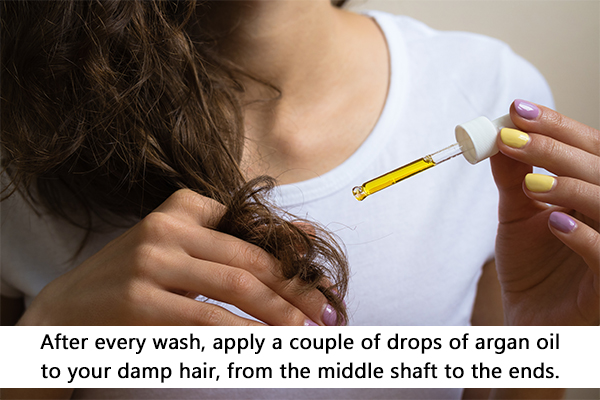
Argan oil is known to help prevent split ends and reverse hair damage. (4) It contains antioxidants, vitamin E, and fatty acids that help rehydrate the hair. (5)
How to use:
After every wash, apply a couple of drops of argan oil to your damp hair, from the middle shaft to the ends.
3. Apply an egg mask
Eggs are rich in proteins and fatty acids that can help strengthen your hair follicles. (6) This can be combined with honey and olive oil to help make your hair stronger and smoother.
How to use:
Mix an egg yolk with 2–3 tablespoons of olive oil and 1 tablespoon of honey. Apply this mixture to damp hair and leave for half an hour. Shampoo your hair after.
4. Treat your hair with honey and almond/olive oil
Almond oil and olive oil help soften, strengthen, and repair the hair. They also provide nutrients such as fatty acids, protein, and vitamin E to the hair.
Honey is rich in vitamins, minerals, amino acids, and antioxidants (7) that help hydrate, condition, and add shine to hair. It also helps repair dry, damaged hair.
How to use:
Mix 3 tablespoons of oil with 2 tablespoons of honey, and apply this mixture to wet hair, especially on the ends, after shampooing. Leave it on for half an hour. Wash and condition your hair after.
5. Apply an apple cider vinegar and herb mix
Apple cider vinegar (ACV) can help by balancing your scalp pH and preventing dandruff, dryness, and flakiness. (8) Moreover, it helps strengthen and soften the hair.
How to use:
Steep a mix of dried nettle, rosemary, and dried sage in 1 cup of water for 10 minutes. Strain the liquid and add ACV. Pour this mixture to your shampooed hair and rinse after a few minutes.
Dietary Tips to Avoid Split Ends
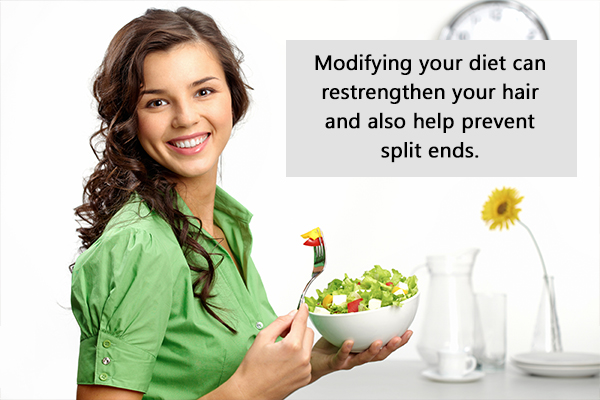
Along with strengthening your hair from the outside, you need to provide it nutrition from the inside. Modifying your diet can restrengthen your hair and also help prevent split ends.
- Stay hydrated. It is vital to consume ample amounts of water, especially during winter. This helps prevent split ends and dryness.
- Eat more protein. Protein intake is essential for the process of hair growth. (9) A lack of protein in your diet can lead to hair fall. Therefore, it is recommended to consume higher amounts of protein through eggs, meats, fish, beans, seeds, and nuts.
- Take biotin supplements. Biotin is a vitamin B derivative, a deficiency of which is associated with hair loss. (10) Biotin supplements can help manage and prevent hair thinning. (9) Make sure to consult your doctor before taking any supplements.
- Consume more iron. An iron deficiency in your diet can also lead to hair loss. (9) You can increase your iron intake by consuming clams, oysters, beans, spinach, iron-fortified cereals, pumpkin seeds, and organ meats. Consult your doctor about the need for supplements.
Preventive Tips for Split Ends
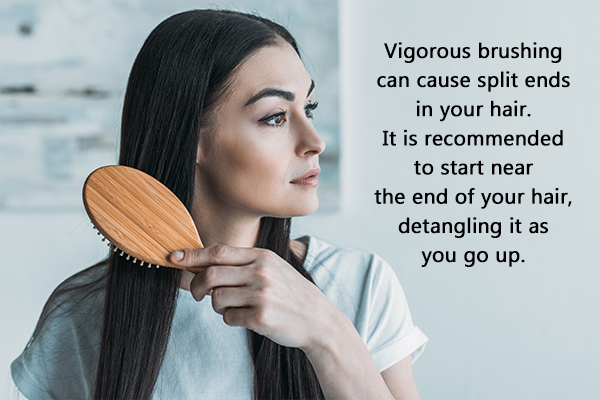
The following measures can help prevent split ends in the first place:
- Brush your hair gently. Vigorous brushing can cause split ends in your hair. It is recommended to start near the end of your hair, detangling it as you go up. (11)
- Avoid heating tools. The heat from blow dryers and straighteners can damage your hair. (12) If necessary, use these tools on low-heat settings.
- Only work with clean hair. Wash your hair thoroughly to remove all traces of oil and conditioner, and use styling tools on clean hair only.
- Do not pick at your split ends. Peeling or tearing the split ends causes more friction, leading to longer and increased number of split ends.
- Use satin pillowcases. These help lower the friction to your hair while sleeping.
- Condition your hair. Always condition your hair after shampooing to soften it. You can also condition before shampooing to help lock in the moisture and protect the hair. (13)
- Avoid coloring your hair. It is best to refrain from hair color and bleach treatments. However, if you choose to get them, do so as rarely as possible or use natural coloring techniques.
- Always use a heat protectant. In case you want to blow-dry or style your hair, make sure to apply a heat protectant.
- Trim regularly. Getting your hair trimmed regularly can help support your hair growth by getting rid of any split ends that might develop problems further.
- Keep your scalp healthy. Split ends are often primarily caused by a dirty or unhealthy scalp. Make sure to keep your scalp clean. However, avoid overwashing and always condition your hair.
- Use a wide-toothed comb. Such combs help detangle your hair gently, preventing damage to the delicate ends. Always start detangling your hair at the ends and work your way up.
Most-Asked Questions About Split Ends
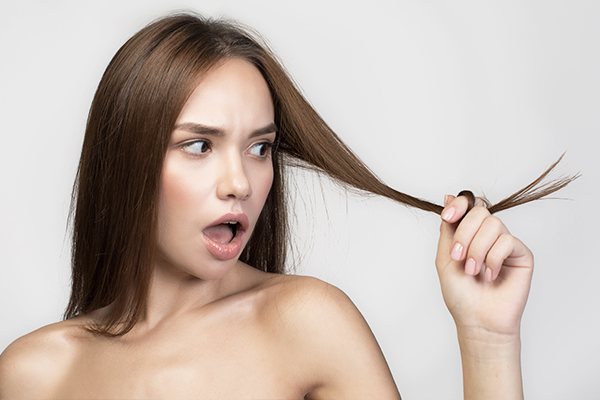
Can one actually repair split ends?
Trimming your hair to get rid of split ends and implementing measures to prevent further damage are the best solutions, but you can also take measures to repair your split ends and restore your hair health.
Does everyone get split ends?
Split ends are a common occurrence, but they may vary in degree of severity depending on genetic makeup, hair-styling habits, environmental conditions, lifestyle, and nutritional status.
How often should one trim the hair?
Hair starts splitting naturally at around 3 months generally. Therefore, getting your hair trimmed every 3–4 months can help maintain your hair health as well as hairstyle. This also prevents any permanent damage. Moreover, you can get your hair trimmed as soon as you see any split ends or feel roughness at the ends.
Final Word
Split ends can severely damage your hair if not tended to. It is best to get your hair trimmed once you develop split ends, followed by proper hair care to prevent their occurrence.
Avoiding hair styling tools, improving your nutritional intake, oiling your hair, and keeping your scalp clean are some measures that can help manage split ends. It is important to protect your hair from any kind of damage to keep your locks healthy, shiny, and soft.

- Was this article helpful?
- YES, THANKS!NOT REALLY


